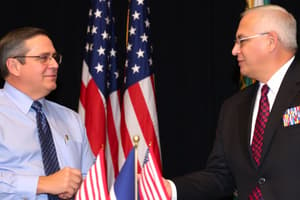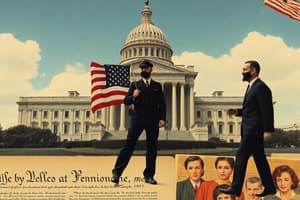Podcast
Questions and Answers
What is the key feature of Realism in international relations?
What is the key feature of Realism in international relations?
- Complexity and interdependence
- Anarchy and the struggle for power (correct)
- Multilateralism
- Division of labor
What does the concept of Unilateralism in foreign policy involve?
What does the concept of Unilateralism in foreign policy involve?
- Avoiding participating in foreign affairs
- Taking advantage of the situation for national gain
- Acting alone, without consulting others (correct)
- Emphasizing morality in foreign affairs
What is the purpose of an embargo in international relations?
What is the purpose of an embargo in international relations?
- Avoiding participating in foreign affairs
- Prohibition of commerce and trade with a certain country (correct)
- Emphasizing morality in foreign affairs
- Taxes on imports used to raise government revenue
What is the focus of the Monroe Doctrine?
What is the focus of the Monroe Doctrine?
Which policy asserted American continents as off-limits for European colonization?
Which policy asserted American continents as off-limits for European colonization?
What marked a shift towards multilateralism in American foreign policy?
What marked a shift towards multilateralism in American foreign policy?
Which agreement led to the creation of the World Bank and IMF?
Which agreement led to the creation of the World Bank and IMF?
What was the focus of Carter's foreign policy?
What was the focus of Carter's foreign policy?
What did Nixon pursue with the Soviet Union?
What did Nixon pursue with the Soviet Union?
Which conflict was part of the containment policy against communism?
Which conflict was part of the containment policy against communism?
Which president viewed the Soviet Union as having limited impact on the international system?
Which president viewed the Soviet Union as having limited impact on the international system?
Who criticized Carter's foreign policy as weak?
Who criticized Carter's foreign policy as weak?
Which proposal was rejected by Congress due to isolationism?
Which proposal was rejected by Congress due to isolationism?
What strengthened US control over the American continent?
What strengthened US control over the American continent?
What was part of the containment policy against communism?
What was part of the containment policy against communism?
What did Carter's administration emphasize the need to build?
What did Carter's administration emphasize the need to build?
Which policy aimed to promote expansion of democracy, open markets, and Western economic and social values?
Which policy aimed to promote expansion of democracy, open markets, and Western economic and social values?
Which organization was established in 1995 to manage multilateral negotiations, reduce trade barriers, and settle trade disputes?
Which organization was established in 1995 to manage multilateral negotiations, reduce trade barriers, and settle trade disputes?
Who was responsible for the 9/11 attacks?
Who was responsible for the 9/11 attacks?
Which administration implemented the Engagement Policy, remaining actively involved in foreign affairs, notably in Somalia?
Which administration implemented the Engagement Policy, remaining actively involved in foreign affairs, notably in Somalia?
Which doctrine advocated preemptive military action against perceived US threats and led to the creation of the Department of Homeland Security?
Which doctrine advocated preemptive military action against perceived US threats and led to the creation of the Department of Homeland Security?
Which president played a significant role in moderating the Cold War despite using tough rhetoric against the Soviets?
Which president played a significant role in moderating the Cold War despite using tough rhetoric against the Soviets?
Which agreement aimed to promote free trade and has been beneficial for Canada?
Which agreement aimed to promote free trade and has been beneficial for Canada?
Which fundamentalist Islamic government of Afghanistan was targeted by the War on Terrorism?
Which fundamentalist Islamic government of Afghanistan was targeted by the War on Terrorism?
Which president's doctrine focused on three facets of American power: diplomacy, military (soft power), and American image and ideals, adopting a multilateral approach?
Which president's doctrine focused on three facets of American power: diplomacy, military (soft power), and American image and ideals, adopting a multilateral approach?
Which rhetoric emphasized anti-communist policy and assistance to anti-communist groups in Afghanistan, S. America, Angola, and Mozambique?
Which rhetoric emphasized anti-communist policy and assistance to anti-communist groups in Afghanistan, S. America, Angola, and Mozambique?
Which doctrine required clear and attainable objectives, public support, and a commitment to national interest before US troops were deployed?
Which doctrine required clear and attainable objectives, public support, and a commitment to national interest before US troops were deployed?
Which trade organization aimed to manage multilateral negotiations, reduce trade barriers, and settle trade disputes?
Which trade organization aimed to manage multilateral negotiations, reduce trade barriers, and settle trade disputes?
Realism in international relations emphasizes the importance of global solutions to problems
Realism in international relations emphasizes the importance of global solutions to problems
Marxist theory of international relations focuses on the dominance of the periphery over the core
Marxist theory of international relations focuses on the dominance of the periphery over the core
Unilateralism in foreign policy means acting alone, without consulting others
Unilateralism in foreign policy means acting alone, without consulting others
An embargo is the promotion of commerce and trade with a certain country
An embargo is the promotion of commerce and trade with a certain country
The Monroe Doctrine aimed to promote expansion of European colonization in the Americas
The Monroe Doctrine aimed to promote expansion of European colonization in the Americas
Multilateralism in foreign policy involves taking actions in cooperation with other nations after consultation
Multilateralism in foreign policy involves taking actions in cooperation with other nations after consultation
Isolationism is a national foreign policy of actively participating in foreign affairs
Isolationism is a national foreign policy of actively participating in foreign affairs
Liberalism in international relations emphasizes anarchy and the struggle for power
Liberalism in international relations emphasizes anarchy and the struggle for power
The focus of Carter's foreign policy was on taking advantage of the situation for national gain
The focus of Carter's foreign policy was on taking advantage of the situation for national gain
The policy of emphasizing morality in foreign affairs is known as pragmatism
The policy of emphasizing morality in foreign affairs is known as pragmatism
Roosevelt’s Corollary strengthened US control over the American continent.
Roosevelt’s Corollary strengthened US control over the American continent.
Woodrow Wilson’s League of Nations proposal was rejected by Congress due to isolationism.
Woodrow Wilson’s League of Nations proposal was rejected by Congress due to isolationism.
The Bretton Woods Agreement led to the creation of the World Bank and IMF.
The Bretton Woods Agreement led to the creation of the World Bank and IMF.
Truman Doctrine, Marshall Plan, and NATO were part of the containment policy against communism.
Truman Doctrine, Marshall Plan, and NATO were part of the containment policy against communism.
Carter's administration viewed the Soviet Union as having limited impact on the international system.
Carter's administration viewed the Soviet Union as having limited impact on the international system.
Nixon normalized relations with China and pursued détente with the Soviet Union.
Nixon normalized relations with China and pursued détente with the Soviet Union.
Carter's administration emphasized the need to build a global community to address common problems and shared future.
Carter's administration emphasized the need to build a global community to address common problems and shared future.
The Monroe Doctrine asserted American continents as off-limits for European colonization.
The Monroe Doctrine asserted American continents as off-limits for European colonization.
World War II casualties and United Nations establishment marked a shift towards multilateralism.
World War II casualties and United Nations establishment marked a shift towards multilateralism.
Korean War and US involvement in Vietnam War were significant conflicts during this period.
Korean War and US involvement in Vietnam War were significant conflicts during this period.
Reagan's actions were consistently confrontational and aggressive towards the Soviets.
Reagan's actions were consistently confrontational and aggressive towards the Soviets.
The Powell Doctrine required the deployment of US troops without clear and attainable objectives.
The Powell Doctrine required the deployment of US troops without clear and attainable objectives.
The Clinton administration implemented the Engagement Policy, remaining actively involved in foreign affairs, notably in Somalia.
The Clinton administration implemented the Engagement Policy, remaining actively involved in foreign affairs, notably in Somalia.
NAFTA has been beneficial for all participating countries, including the United States.
NAFTA has been beneficial for all participating countries, including the United States.
The WTO was established in 1995 to manage multilateral negotiations, reduce trade barriers, and settle trade disputes.
The WTO was established in 1995 to manage multilateral negotiations, reduce trade barriers, and settle trade disputes.
The 9/11 attacks were carried out by a different terrorist organization, not Al-Qaeda.
The 9/11 attacks were carried out by a different terrorist organization, not Al-Qaeda.
The War on Terrorism targeted the Taliban, a fundamentalist Islamic government of Afghanistan, which had been previously supported by the US to fight the U.S.S.R.
The War on Terrorism targeted the Taliban, a fundamentalist Islamic government of Afghanistan, which had been previously supported by the US to fight the U.S.S.R.
The Bush Doctrine advocated diplomatic solutions and rejected the idea of preemptive military action.
The Bush Doctrine advocated diplomatic solutions and rejected the idea of preemptive military action.
The Obama Doctrine focused solely on military power and disregarded diplomacy and American image and ideals.
The Obama Doctrine focused solely on military power and disregarded diplomacy and American image and ideals.
The text includes quotes from Eisenhower's warning about the potential influence of the military-industrial complex and Obama's reflection on the cost of armed conflict and the necessity of force in certain situations.
The text includes quotes from Eisenhower's warning about the potential influence of the military-industrial complex and Obama's reflection on the cost of armed conflict and the necessity of force in certain situations.
Flashcards are hidden until you start studying
Study Notes
US Foreign Policy and National Security: A Historical Overview
- Reagan's "Vietnam Syndrome" rhetoric emphasized anti-communist policy and assistance to anti-communist groups in Afghanistan, S. America, Angola, and Mozambique.
- Despite using tough rhetoric against the Soviets, Reagan's actions were often more conciliatory, and he played a significant role in moderating the Cold War.
- The Powell Doctrine required clear and attainable objectives, public support, and a commitment to national interest before US troops were deployed.
- The Clinton administration implemented the Engagement Policy, remaining actively involved in foreign affairs, notably in Somalia.
- The Enlargement policy aimed to promote expansion of democracy, open markets, and Western economic and social values.
- NAFTA, the North American Free Trade Agreement, aimed to promote free trade and has been beneficial for Canada.
- The WTO, World Trade Organization, was established in 1995 to manage multilateral negotiations, reduce trade barriers, and settle trade disputes.
- The 9/11 attacks were carried out by Al-Qaeda, a terrorist organization responsible for previous attacks on American targets.
- The War on Terrorism targeted the Taliban, a fundamentalist Islamic government of Afghanistan, which had been previously supported by the US to fight the U.S.S.R.
- The Bush Doctrine advocated preemptive military action against perceived US threats and led to the creation of the Department of Homeland Security.
- The Obama Doctrine focused on three facets of American power: diplomacy, military (soft power), and American image and ideals, adopting a multilateral approach.
- The text includes quotes from Eisenhower's warning about the potential influence of the military-industrial complex and Obama's reflection on the cost of armed conflict and the necessity of force in certain situations.
US Foreign Policy and National Security: A Historical Overview
- Reagan's "Vietnam Syndrome" rhetoric emphasized anti-communist policy and assistance to anti-communist groups in Afghanistan, S. America, Angola, and Mozambique.
- Despite using tough rhetoric against the Soviets, Reagan's actions were often more conciliatory, and he played a significant role in moderating the Cold War.
- The Powell Doctrine required clear and attainable objectives, public support, and a commitment to national interest before US troops were deployed.
- The Clinton administration implemented the Engagement Policy, remaining actively involved in foreign affairs, notably in Somalia.
- The Enlargement policy aimed to promote expansion of democracy, open markets, and Western economic and social values.
- NAFTA, the North American Free Trade Agreement, aimed to promote free trade and has been beneficial for Canada.
- The WTO, World Trade Organization, was established in 1995 to manage multilateral negotiations, reduce trade barriers, and settle trade disputes.
- The 9/11 attacks were carried out by Al-Qaeda, a terrorist organization responsible for previous attacks on American targets.
- The War on Terrorism targeted the Taliban, a fundamentalist Islamic government of Afghanistan, which had been previously supported by the US to fight the U.S.S.R.
- The Bush Doctrine advocated preemptive military action against perceived US threats and led to the creation of the Department of Homeland Security.
- The Obama Doctrine focused on three facets of American power: diplomacy, military (soft power), and American image and ideals, adopting a multilateral approach.
- The text includes quotes from Eisenhower's warning about the potential influence of the military-industrial complex and Obama's reflection on the cost of armed conflict and the necessity of force in certain situations.
Studying That Suits You
Use AI to generate personalized quizzes and flashcards to suit your learning preferences.




